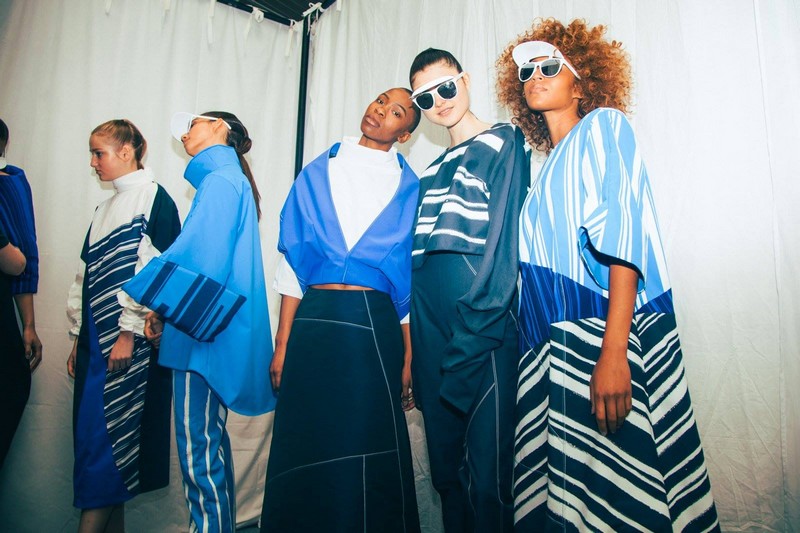
Graduate Fashion Week: Perfecting the final looks backstage at Norwich University of the Arts’ GFW 2017 show; Photography: Rory James www.facebook.com/GraduateFashionWeek/
The future of fashion is sustainable if graduate fashion week is anything to go by. The annual four-day event event at London’s Old Truman Brewery comprises installations, catwalk shows and two prize-giving ceremonies and promises to uncover the torchbearers of “considered design”, according to the event’s creative and managing director, Martyn Roberts.
Roberts believes that graduates can help existing fashion houses and retailers tap into “what a new generation of consumers want”. As brands from every echelon seek to improve their social, economic and environmental impact, graduate fashion week, says Roberts, is where many companies are looking for creatives for whom sustainability is intrinsic, as opposed to an afterthought, to show them how it’s done.
“We are talking to a lot of brands who know that [sustainability] is important to their consumers – particularly the young ones – but they don’t know how to incorporate it into their offerings in a credible and desirable way.”

Roberts has been careful to use the term “considered” rather than “sustainable” design to encourage a mindful approach to every element of the graduates’ work rather than focus on 100% sustainability, which remains challenging. Participating students this year include Rose Connor from the University of Central Lancashire, who has based her graduate collection on upcycled plastics, developing new fabrics through heat-pressing discarded household items such as shower curtains and mesh sponges; and Sarah Seb from the University of East London, who addresses the issue of waste by reconstructing secondhand clothes to avoid the creation of new materials.
Roberts believes current fashion graduates can be the voice of change that the fast-fashion industry needs, which is often regarded as the facilitator of exploitation.
“We need to have conversations with all brands, we can’t just say ignore one because it’s bad… you need to open up conversations with all levels of the industry. The only way forward is by having new talent coming in and showing them the way that brands become leaders that people follow. The reality of any company is that it needs to be a commercial business and if the consumers are wanting something different, they need to adjust to that.”
Over the last three decades, graduate fashion week has helped kickstart the careers of many household fashion names, including the former Burberry chief creative officer Christopher Bailey, Julien MacDonald and Stella McCartney. The main aim of the event is to provide a platform for fashion graduates (this year 36 UK and 51 international universities will take part) to exhibit their collections, share their ideas, as well as meet mentors and recruiters. Its end goal is to bridge the gap between education and employment, with disciplines ranging from fashion design and photography to illustration and marketing.
Graduate fashion week 2018 which begins on Sunday will select three graduates for their sustainable ideas. The Considered Design award, the Vivienne Westwood sustainable and ethical award, and the Swarovski sustainable accessories competition are three of more than 30 prizes to be handed out over the four-day event with offers of mentorship and financial grants as rewards. This year also sees Nadja Swarovski and Diane von Furstenberg join Victoria Beckham, Christopher Bailey and Vivienne Westwood as lifetime patrons of GFW.
Creating and nurturing leaders of the future also means equipping them with the skills to enter an intensely competitive industry, says Prof Caryn Franklin MBE. The former Clothes Show presenter, who has been involved with GFW since its inception in 1991, works closely with the event to help manage graduates’ mental health as they enter a global industry. This year she will moderate two talks on emotional intelligence.

“I’m dealing with graduates who can see a dysfunctional fashion system that is exploitative. Their heroes, people like Alexander McQueen, have created the dream pathway and got to a place that many young creatives are encouraged to aim for – and for what?” says Franklin, who insists that stress tolerance tools are key to preventing graduates from becoming overwhelmed.
“I want them to be equipped with the ability to overcome adversity; to manage their emotions and the emotions of others in order to protect themselves; to recognise opportunities for stealth disruption to unhealthy situations; and to empower others through kindness. Leadership has become tyrannical, across the board everywhere, and we’re all looking at how to challenge it.”
The role of GFW, says Roberts, is to be a leader for positive, supportive and realistic change, laying the groundwork on all levels to ensure longevity for graduates and the fashion industry – a “win win situation”, as he puts it, which involves constant communication and education. “When students come out in three or four years time, what roles will be ready for them in the industry? And will the industry be ready for what they have to offer? It’s a two-way conversation. The more we talk with brands at all levels, the more our graduates will be prepared for them and they will be prepared for the graduates.”
guardian.co.uk © Guardian News & Media Limited 2010
Published via the Guardian News Feed plugin for WordPress.

